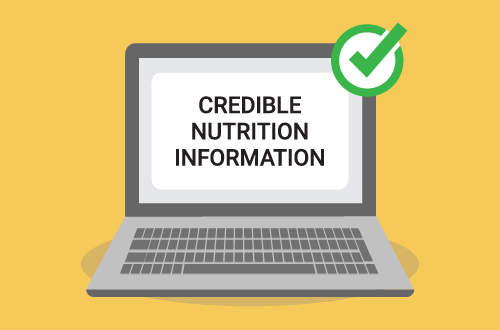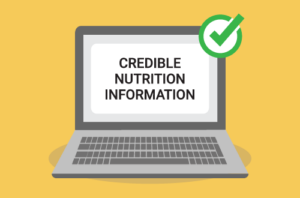Do you look for weight loss food and nutrition information on the internet? With an endless amount of nutrition advice and conflicting messages available, finding good quality information that you can trust is often a challenge.
While some food and nutrition recommendations are based on strong scientific research, many are not. Some advice can be incorrect, misleading, and may even be dangerous to your health. Here are a few tips to help you sort through the information.
Look for ‘red flags’
Ask yourself the following questions to help you decide what is true and what is not:
- Is there a promise of a quick fix like fast weight loss or a miracle cure? Is there a sensational headline for the next big thing? If a diet or product sounds too good to be true, then it likely is. Making changes in your habits means a long-term commitment to healthy eating and physical activity.
- Is information based on personal stories or testimonials? It may be nice to hear a success story from a celebrity or friend, but it’s not proof that something works or is true. Nutrition advice should be based on the best available research.
- Is the advice based on a single study? The best answers to food and nutrition questions are found by combining the results of many studies. The more research that shows the same results the more trustworthy the advice is. Also, the more people in the study and the longer its duration, the stronger the results will be.
- What are the writers’ qualifications? You wouldn’t ask a celebrity how to design a bridge, you’d ask an engineer. The same thinking should apply to nutrition advice. Check the website section “about us” to find out more about the people or company responsible for the website.
- Does the advice include buying special products or replacing foods with supplements? Food is the best source of nutrients. Special products and supplements are usually not needed to improve your health.
- Does the advice emphasize a single food or nutrient? Current food and nutrition evidence shows greater health benefits from eating a variety of nutritious whole foods rather than focusing on single foods or nutrients.
- Is the information on the website current? Reliable websites will include the date of when a webpage was written and be regularly updated to reflect the most current nutrition information and advice available.
Seek out a weight loss and nutrition professionals
Registered Dietitians (RDs) are provincially regulated professionals who have specific training and a university degree in foods and nutrition. Provincial colleges protect the public by ensuring dietitians practice safely, ethically, and competently.
Choose trustworthy websites
Look for websites from trusted sources such as educational institutions, government agencies and professional organizations. These websites will often end in .edu, .gov, or .org
Use the list of reliable websites below to get started. Websites ending in .com mean that they are commercial sites and may contain either accurate or inaccurate information. Look closely and assess for red flags to make sure that the information is not biased.
Here are a few reliable websites related to specific conditions:
- Allergy Canada – https://foodallergycanada.ca/
- Arthritis Society – https://arthritis.ca/
- Canadian Cancer Society – https://www.cancer.ca/
- Canadian Society of Intestinal Research – www.badgut.org/
- Celiac Association of Canada – https://www.celiac.ca/
- Diabetes Canada – https://www.diabetes.ca/
- Heart and Stroke Foundation – http://www.heartandstroke.ca/
- Hypertension Canada – https://hypertension.ca/
- Osteoporosis Canada – https://osteoporosis.ca/
Get more nutrition information from certified weight loss professionals by becoming a Harvey Brooker member. Get an information call and attend a free meeting today!
Struggling with erectile dysfunction? Check out our blog post on ED, its causes, and its cures!








